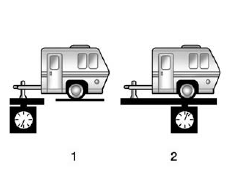Chevrolet Captiva Owners Manual: Trailer Towing
Three important considerations have to do with weight:
- The weight of the trailer
- The weight of the trailer tongue
- The total weight on the vehicle's tires
Weight of the Trailer
How heavy can a trailer safely be? Speed, altitude, road grades, outside temperature, special equipment, and the amount of tongue weight the vehicle can carry must be considered. See "Weight of the Trailer Tongue" later in this section for more information.
Maximum trailer weight is calculated assuming only the driver is in the tow vehicle and it has all the required trailering equipment. The weight of additional optional equipment, passengers and cargo in the tow vehicle must be subtracted from the maximum trailer weight.
Use the following chart to determine how much the vehicle can weigh, based upon the vehicle model and options.

Ask your dealer for our trailering information or advice.
Weight of the Trailer Tongue
The tongue load (1) of any trailer is an important weight to measure because it affects the total gross weight of the vehicle. The Gross Vehicle Weight (GVW) includes the curb weight of the vehicle, any cargo carried in it, and the people who will be riding in the vehicle.
If there are a lot of options, equipment, passengers or cargo in the vehicle, it will reduce the tongue weight the vehicle can carry, which will also reduce the trailer weight the vehicle can tow. If towing a trailer, the tongue load must be added to the GVW because the vehicle will be carrying that weight, too. See Vehicle Load Limits on page 9-10.

If a weight-carrying hitch or a weight-distributing hitch is being used, the trailer tongue (1) should weigh 10-15 percent of the total loaded trailer weight (2).
After loading the trailer, weigh the trailer and then the tongue, separately, to see if the weights are proper. If they are not, adjustments might be made by moving some items around in the trailer.
Trailering may be limited by the vehicle's ability to carry tongue weight. Tongue weight cannot cause the vehicle to exceed the GVWR (Gross Vehicle Weight Rating) or the RGAWR (Rear Gross Axle Weight Rating). The effect of additional weight may reduce the trailering capacity more than the total of the additional weight.
It is important that the vehicle does not exceed any of its ratings — GCWR, GVWR, RGAWR, Maximum Trailer Rating or Tongue Weight.
The only way to be sure it is not exceeding any of these ratings is to weigh the vehicle and trailer.
Total Weight on the Vehicle's Tires
Inflate the vehicle's tires to the upper limit for cold tires. These numbers can be found on the Certification label or see Vehicle Load Limits on page 9-10 for more information. Do not go over the GVW limit for the vehicle, or the GAWR, including the weight of the trailer tongue. If using a weight distributing hitch, do not go over the rear axle limit before applying the weight distribution spring bars.
 Driving Characteristics and Towing Tips
Driving Characteristics and Towing Tips
Driving with a Trailer
When towing a trailer:
Become familiar with the state
and local laws that apply
specifically to trailer towing.
Do not tow a trailer during the
first 800 km (500 mi ...
 Towing Equipment
Towing Equipment
Hitches
It is important to have the correct
hitch equipment. Crosswinds, large
trucks going by, and rough roads
are a few reasons why the right
hitch is needed.
The rear bumper on the vehicle ...
More about:
Chevrolet Captiva Owners Manual > Controls: Rear Window Wiper/ Washer
The rear wiper and rear wash button is on the instrument panel above the climate control system.
(Rear Wiper/Washer): Press to wash and wipe the rear window.
The rear window washer uses the same reservoir as the windshield washer. Check the windshield washer reservoir level if the front windshi ...
Chevrolet Captiva Owners Manual
- Introduction
- In Brief
- Keys, Doors, and Windows
- Seats and Restraints
- Storage
- Instruments and Controls
- Lighting
- Infotainment System
- Climate Controls
- Driving and Operating
- Vehicle Care
- Service and Maintenance
- Technical Data
- OnStar
